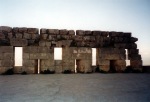George I Gurdjieff (1866? – 1949) was a Greek – Armenian who introduced the Fourth Way to the Western world. His Greek name is Georgiades which has been “Russified” to Gurdjieff by which he is more commonly known. Gurdjieff’s ideas have touched me to the core and I can say that of all the spiritual teachings available to us today, that his resonates in a very deep way with my own needs and search.

G I Gurdjieff
Below are some “Recommendations for Living” from a Spanish site that states these are Gurdjieff’s. Don’t know if this the case but they feel right. Both the original in Spanish and an English translation are here, plus a link to the original source is provided at the end of the quote:
1. Fija tu atención en ti mismo, sé consciente en cada instante de lo que piensas, sientes, deseas y haces.
~ Fix your attention in yourself, be conscious at every instant of what you think, feel, want and do.
2. Termina siempre lo que comenzaste.
~ Always finish what you started.
3. Haz lo que estás haciendo lo mejor posible.
~ Do your best with whatever it is you are doing.
4. No te encadenes a nada que a la larga te destruya.
~ Do not chain yourself to anything that will destroy you on the long haul.
5. Desarrolla tu generosidad sin testigos.
~ Develop your generosity without witnesses.
6. Trata a cada persona como si fuera un pariente cercano.
~ Treat every person as if they were a close relative.
7. Ordena lo que has desordenado.
~ Order what you have messed up.
8. Aprende a recibir, agradece cada don.
~ Learn to receive, thank every gift.
9. Cesa de autodefinirte.
~ Cease to autodefine yourself.
10. No mientas ni robes, si lo haces te mientes y te robas a ti mismo.
~ Do not lie or steal, if you do, you lie to and steal from yourself.
11. Ayuda a tu prójimo sin hacerlo dependiente.
~ Help your neighbor without making him dependent.
12. No desees ser imitado.
~ Do not wish to be imitated.
13. Haz planes de trabajo y cúmplelos.
~ Make work plans and carry them out.
14. No ocupes demasiado espacio.
~ Do not take too much space.
15. No hagas ruidos ni gestos innecesarios.
~ Do not make unnecessary noises or gestures.
16. Si no la tienes, imita la fe.
~ If you don’t have it, imitate faith.
17. No te dejes impresionar por personalidades fuertes.
~ Do not let yourself be impressed by strong personalities.
18. No te apropies de nada ni de nadie.
~ Do not take possession of anything or anyone.
19. Reparte equitativamente.
~ Distribute equitably.
20. No seduzcas.
~ Do not seduce.
21. Come y duerme lo estrictamente necesario.
~ Eat and sleep what’s strictly necessary.
22. No hables de tus problemas personales.
~ Do not speak of your personal problems.
23. No emitas juicios ni críticas cuando desconozcas la mayor parte de los hechos.
~ Do not emit judgments or criticisms when you do not know most of the facts.
24. No establezcas amistades inútiles.
~ Do not establish useless friendships.
25. No sigas modas.
~ Do not follow fashions.
26. No te vendas.
~ Do not sell yourself.
27. Respeta los contratos que has firmado.
~ Respect the contracts you have signed.
28. Sé puntual.
~ Be on time.
29. No envidies los bienes o los éxitos del prójimo.
~ Do not envy the goods or successes of your neighbor.
30. Habla sólo lo necesario.
~ Say only what’s necessary.
31. No pienses en los beneficios que te va a procurar tu obra.
~ Do not think of the benefits that your actions will bring you.
32. Nunca amenaces.
~ Never threaten.
33. Realiza tus promesas.
~ Keep your promises.
34. En una discusión ponte en el lugar del otro.
~ In a discussion put yourself in the place of the other.
35. Admite que alguien te supere.
~ Admit that someone might supersede you.
36. No elimines, sino transforma.
~ Do not eliminate, transform.
37. Vence tus miedos, cada uno de ellos es un deseo que se camufla.
~ Conquer your fears, each one of them is a desire that camouflages itself.
38. Ayuda al otro a ayudarse a si mismo.
~ Help the other help himself.
39. Vence tus antipatías y acércate a las personas que deseas rechazar.
~ Conquer your antipathies and get close to the persons you wish to reject.
40. No actúes por reacción a lo que digan bueno o malo de ti.
~ Do not act out of a reaction to what good or bad they say about you.
41. Transforma tu orgullo en dignidad.
~ Transform your pride in dignity.
42. Transforma tu cólera en creatividad.
~ Transform your anger into creativity.
43. Transforma tu avaricia en respeto por la belleza.
~ Transform your greed into respect for beauty.
44. Transforma tu envidia en admiración por los valores del otro.
~ Transform your envy into admiration for the values of the other.
45. Transforma tu odio en caridad.
~ Transform your hate into charity.
46. No te alabes ni te insultes.
~ Do not praise nor insult yourself.
47. Trata lo que no te pertenece como si te perteneciera.
~ Treat what doesn’t belong to you as if it did.
48. No te quejes.
~ Do not complain.
49. Desarrolla tu imaginación.
~ Develop your imagination.
50. No des órdenes sólo por el placer de ser obedecido.
~ Do not give orders just for the pleasure of being obeyed.
51. Paga los servicios que te dan.
~ Pay for the services that you are given.
52. No hagas propaganda de tus obras o ideas.
~ Do not make propaganda of your doings or ideas.
53. No trates de despertar en los otros emociones hacia ti como piedad, admiración,
simpatía, complicidad.
~ Do not try to awaken in others emotions towards you like compassion, admiration, sympathy or complicity.
54. No trates de distinguirte por tu apariencia.
~ Do not try to distinguish yourself by your appearance.
55. Nunca contradigas, sólo calla.
~ Never contradict, just be silent.
56. No contraigas deudas, adquiere y paga en seguida.
~ Do not contract debts, acquire and pay right away.
57. Si ofendes a alguien, pídele perdón.
~ If you offend someone, ask for forgiveness.
58. Si lo has ofendido públicamente, excúsate en público.
~ If you have offended him publicly, apologize in public.
59. Si te das cuenta de que has dicho algo erróneo, no insistas por orgullo en ese error y
desiste de inmediato de tus propósitos.
~ If you realize you have said something wrong, do not insist out of pride on that mistake, and desist immediately of your intentions.
60. No defiendas tus ideas antiguas sólo por el hecho de que fuiste tú quien las enunció.
~ Do not defend your old ideas just because of the fact that it was you who uttered them.
61. No conserves objetos inútiles.
~ Do not keep useless objects.
62. No te adornes con ideas ajenas.
~ Do not adorn yourself with others’ ideas.
63. No te fotografíes junto a personajes famosos.
~ Do not take Pictures of you next to famous characters.
64. No rindas cuentas a nadie, sé tu propio juez.
~ Do not explain yourself to anyone, be your own Judge.
65. Nunca te definas por lo que posees.
~ Never define yourself by what you posses.
66. Nunca hables de ti sin concederte la posibilidad de cambiar.
~ Never speak of yourself without granting yourself the possibility of changing.
67. Acepta que nada es tuyo.
~ Accept that nothing is yours.
68. Cuando te pregunten tu opinión sobre algo o alguien, di sólo sus cualidades.
~ When asked your opinion about something or someone, only say their qualities.
69. Cuando te enfermes, en lugar de odiar ese mal considéralo tu maestro.
~ When you are sick, instead of hating that illness consider it your teacher.
70. No mires con disimulo, mira fijamente.
~ Do not look hintedly, look straight.
71. No olvides a tus muertos, pero dales un sitio limitado que les impida invadir toda tu vida.
~ Do not forget your dead, but give them a limited place that impedes them from invading all your life.
72. En el lugar en que habites consagra siempre un sitio a lo sagrado.
~ In the place you live consecrate always a place for the sacred.
73. Cuando realices un servicio no resaltes tus esfuerzos.
~ When you perform a service do not highlight your efforts.
74. Si decides trabajar para los otros, hazlo con placer.
~ If you decide to work for others, do it with pleasure.
75. Si dudas entre hacer y no hacer, arriésgate y haz.
~ If you doubt between doing and not doing, take a risk and do.
76. No trates de ser todo para tu pareja; admite que busque en otros lo que tú no puedes darle.
~ Don’t try to be everything for your couple; admit he/she may search for in others what you cannot give him/her.
77.Cuando alguien tenga su público, no acudas para contradecirlo y robarle la audiencia.
~ When someone has their public, do not approach to contradict or steal the audience.
78. Vive de un dinero ganado por ti mismo.
~ Live off of money earned by yourself.
79. No te jactes de aventuras amorosas.
~ Do not boast about love affairs.
80. No te vanaglories de tus debilidades.
~ Do not vainglory yourself of your weaknesses.
81. Nunca visites a alguien sólo por llenar tu tiempo.
~ Never visit someone just to fill your time.
82. Obtén para repartir.
~ Obtain in order to share.
83. Si estás meditando y llega un diablo, pon ese diablo a meditar.
~ If you are meditating and a devil arrives, put that devil to meditate.
http://www.librosdeluz.net/2008/04/mandamientos-de-gurdjieff.html#
Here are some photos of Gurdjieff and some of the key people in the Work:
http://digitalseance.wordpress.com/galerie-dimage/la-galerie-de-gurdjieff/





 Posted by stavr0s
Posted by stavr0s 






















































































































































































































